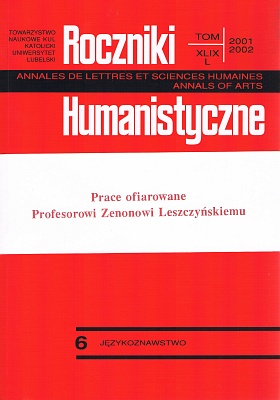On the Concept of Intensification
Abstract
The paper discusses the concept of intensification: the increase of features, states, processes, subordination to the broader concept of intensity which concerns also the weakening of those semantic values. The subject matter here is the absolute intensity, one that is different from the relative gradation of adjectives and adverbs. A adjectives and adverbs are subject to such intensification a fact that points to parametric features and are connected with number and measure (bardzo dużo [a great deal of], bardzo małe [very small], bardzo długie [very long], bardzo szerokie [very wide]), that denote coming to look somehow (bardzo wyładnieć [to become very pretty], bardzo zbrzydnąć [to become very ugly]), adjectives, adverbs, verbal nouns meaning human feelings and sensations (bardzo się cieszyć [to be very happy about sth], bardzo się martwić [to be very worried], wielki niepokój [great anxiety], wielki ból [great pain]) or evaluating (bardzo dobrze [very well], bardzo zdolny [very talented], bardzo ładny [very pretty], wielka podłość [great meanness], wielka zbrodnia [great crime]), verbs dealing with such activities as oszukiwać (deceive), kręcić (cheat), poświęcać się (sacrifice oneself), and also noun derivatives such as krętacz (cheater), leń (idler), patriota (patriot). Intensification may be indirect, as in the case of expressions with adjectives and adverbs with parametric features, e.g. bardzo szeroki (very wide) is “much wider than the norm” (here intensification refers directly to the comparative, and not to the basic form of the adjective). The semantics of the expression with the verb meaning becoming is similar, e.g. bardzo wyładnieć (to become very pretty) means “to become much prettier than in the past.” In the direct intensification the intensifier informs directly than something is more intense than it follows from the intensified lexem, cf. e.g. Piotr bardzo się cieszy (Piotr is very pleased).
Copyright (c) 2002 Roczniki Humanistyczne

This work is licensed under a Creative Commons Attribution-NonCommercial-NoDerivatives 4.0 International License.





